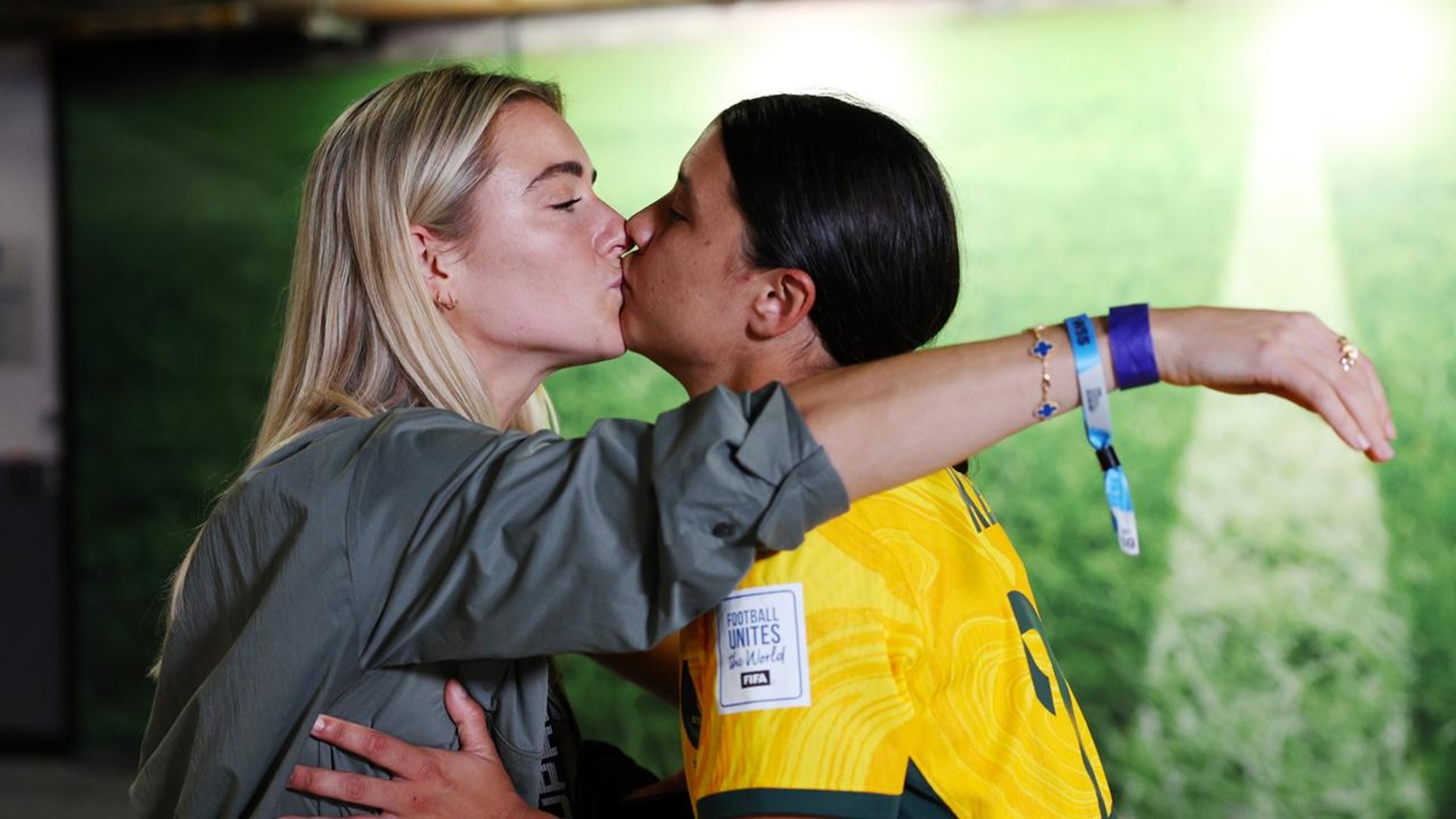
Pride on the Pitch: Matildas Show True Colours at the World Cup
Picture: Sam Kerr of Australia celebrates with her partner Kristie Mewis. Photo Source: Elsa – FIFA/FIFA via Getty Images
In the world of sports, the ability to unite diverse talents and backgrounds under one banner often stands as a powerful testament to the shared spirit of competition. Nowhere is this more evident than in the exhilarating spectacle of the FIFA Women’s World Cup, where athletes from various corners of the globe come together to showcase their prowess on the pitch. As the 2023 Women’s World Cup unfolds in Australia and New Zealand, there’s a unique story unfolding within the Australian Women’s Football team, the Matildas – a narrative of courage, inclusion, and the challenge of breaking down stereotypes.
A recent article by OutSports highlighted a staggering revelation that a record number of at least 96 LGBTQ athletes are participating in the Women’s World Cup, a groundbreaking figure that amounts to over 13% of all competitors. This wave of visibility and acceptance is transforming the landscape of women’s sports, one goal at a time.
It’s worth acknowledging that while society’s attitudes towards LGBTQ athletes have undeniably progressed, certain stereotypes still loom over their presence on the field. Historically, women who participated in sports perceived as traditionally male-dominated often faced the assumption that they were LGBTQ, a common misconception that is still noticed in today’s society. Such perceptions can create a sense of otherness and exclusion for LGBTQ athletes, who find themselves unfairly pigeonholed based on their sexuality rather than celebrated for their athletic achievements.
In the case of the Matildas, this tale of triumph over stereotypes is vividly illustrated by the stories of players who identify as LGBTQ. These athletes are paving the way for a new era of inclusivity, courageously defying misconceptions and stereotypes. Names like Mackenzie Arnold, Ellie Carpenter, Alex Chidiac, Katrina Gorry, Teagan Micah, Kyah Simon, Emily Van Egmond, Cortnee Vine, Tameka Yallop and FIFA’s highest rated player, Sam Kerr [pictured], are rewriting the narrative by being true to themselves both on and off the field. Their stories resonate far beyond the stadium walls, sending a resounding message to LGBTQ youth across the globe: there’s a place in sports for everyone, exactly as they are.
The significance of this milestone cannot be overstated. The Matildas’ presence as out and proud athletes in such a high-profile tournament is a testament to the progress that has been made, but also an acknowledgment that there’s more work to be done. These women are catalysts for change, proving that being authentic to one’s identity doesn’t compromise success. Their stories inspire countless others, and their visibility challenges the notion that LGBTQ athletes don’t belong in sports.
“These women are catalysts for change, proving that being authentic to one’s identity doesn’t compromise success.”
However, it’s crucial to recognise that challenges still persist. The prevalence of stereotypes and misconceptions reveals that the road to true inclusivity is not without its obstacles. Even as the statistics demonstrate growing acceptance, the journey towards eliminating biases is ongoing. The revelation that almost 90% of female athletes believe that playing certain sports labels them as LGBTQ[1] is a stark reminder of the work that remains to challenge these stereotypes.
Within this context, initiatives like Pride in Sport emerge as significant drivers of change. Our primary goal is to cultivate environments within sports that are safe, enjoyable, and inclusive for LGBTQ individuals. Moreover, there is a clear business case for collaborative efforts between sporting organisations and initiatives like Pride in Sport to establish spaces that empower LGBTQ athletes to excel without the weight of stereotypes and biases.
The Matildas, beyond their remarkable performance on the pitch, are becoming pioneers of change. Their stories, similar to those of renowned athlete Alex Blackwell (Pride in Sport Co-Patron), are narratives of resilience, courage, and the transformation of perceptions. Blackwell’s journey from being profiled as a predator due to her sexuality to becoming a powerful advocate for LGBTQ inclusion exemplifies the transformation that is possible when athletes stand up and speak out.
As the Matildas continue their journey in the Women’s World Cup, they stand as champions not only for their sport but also for the LGBTQ community. Their presence on the international stage is a testament to the transformative power of visibility, breaking down barriers, and rewriting the narrative for LGBTQ athletes. Each goal they score and every game they play sends a resounding message: sports is a realm of acceptance and opportunity for all – regardless of who they love or how they identify.
In the end, the Matildas are not only aiming for victory on the pitch but also for a triumph of equality and inclusion. They are embodying the spirit of fair play by fighting for a world where stereotypes are shattered, and athletes can shine based on their talent and dedication. Their journey serves as a reminder that the field of play should be a space where everyone is celebrated, respected, and welcomed.
Find out more about Pride in Sport. Visit www.prideinsport.com.au
Article written by Beau Newell, National Program Manager – Pride in Sport (15.08.2023)
[1] Pride in Sport (2023). Pride in Sport Index (PSI) National Survey. ACON’s Pride Inclusion Programs
